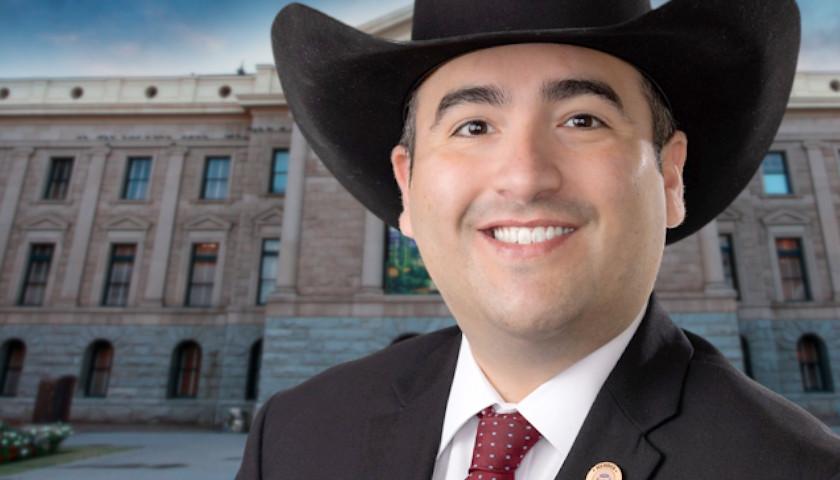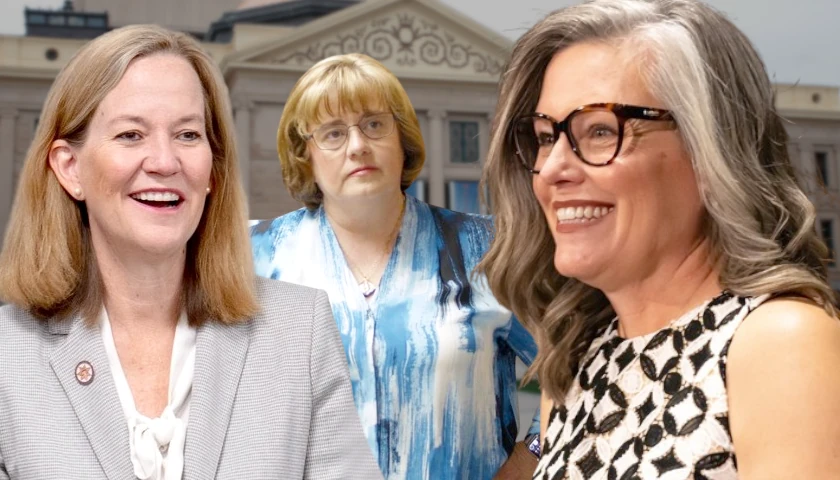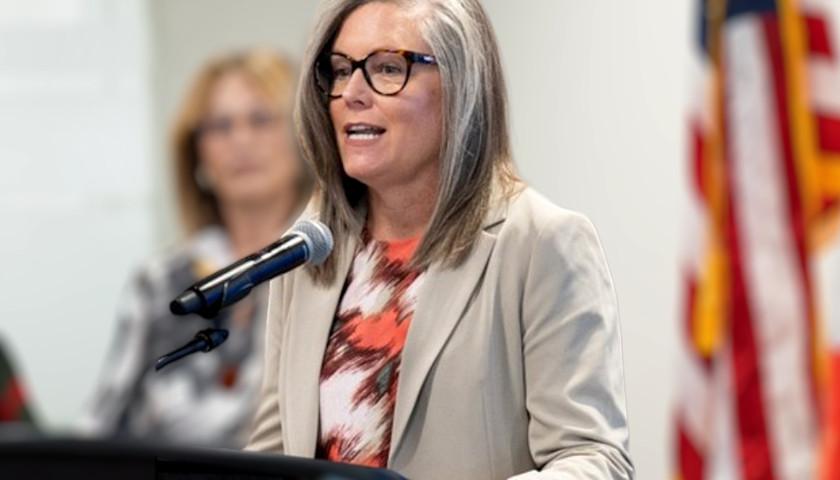Arizona Governor Katie Hobbs is facing increased scrutiny following revelations of an alleged “pay-for-play” scheme uncovered by a left-leaning publication with media ads hitting the airwaves this week. State-solutions, Inc., affiliated with the Republican Governor’s Association, has invested in a six-figure advertisement campaign to highlight the investigation into Hobbs.
The ad says, “Tell Hobbs to cooperate and cut the corruption.”
Both Attorney General Kris Mayes, a Democrat, and Maricopa County Attorney Rachel Mitchell, a Republican, have asserted claims over the investigation.
Attorney Gina Godbehere, who is challenging Mitchell in a competitive primary told The Arizona Sun Times, “My opponent [Mitchell] should be more concerned about the effect of her lenient policies on our community, the victims, and law enforcement rather than chasing the political spotlight.
The story broke after Arizona PBS revealed Sunshine Residential, a significant donor to the Hobbs Inaugural fund and the Democrats, received a nearly 60 percent increase in state contracts. The ad released this week told Arizonans, “Three days after a state agency denied a contractor’s request to charge taxpayers higher rates, a donation appeared: $100,00 from the same company… into a slush fund controlled by Governor Katie Hobbs. Within months, the Hobbs administration reversed course, approving the request for more taxpayer money. Pay-to-play so brazen, Democrat Attorney General Kris Mayes has launched a criminal investigation.”
Battle for Control in Hobbs Investigation
State Senator T.J. Shope (R-LD16) (pictured here) sent a letter to Mayes and Mitchell, seeking an examination of the possible “pay-to-play” allegations. Shope stated that if true, they could implicate several state laws, including bribery, fraud, Arizona procurement violations, conflict of interest, and illegal expenditure of state funds.

Mayes’ office responded, “The Criminal Division of the Attorney General’s Office is authorized to investigate the allegations outlined in your letter. Accordingly, we will be opening an investigation.”
In her letter, Mitchell (pictured above, center) stated, “My chief deputy is scheduling a meeting between the Auditor General’s staff and assigned personnel from my office. We will keep you both informed as much as possible as we proceed with the next steps in this matter.”
Mayes (pictured above, left) then sent letters to the Arizona Auditor General’s Office and the Maricopa County Attorney’s Office, asserting her office’s authority over the investigation. She stated that conducting parallel investigations into Sunshine Residential Homes “could jeopardize the integrity of the criminal investigation that my office will now proceed with.”
Governing Authority
According to the Arizona Revised Statutes, Title 41, Section 193 (ARS 41-193), the Arizona Attorney General (AG) has the authority to investigate and prosecute violations of state laws, including corruption, fraud, and other criminal activities .
Mayes has asserted sole jurisdiction of the investigation into Hobbs’s alleged pay-to-play scheme. Under Arizona law, Mayes’s Criminal Division of the AG’s Office would handle the investigation and determine if criminal charges are warranted.
Republican State Treasurer Kimberly Yee released a letter asserting that the Maricopa County Attorney’s Office, not Mayes, should handle the investigation. “The Attorney General wrongfully asserted that she has singular control over any investigation,” said Yee.
But under ARS Title 11, Section 532 (ARS 11-532), the Maricopa County Attorney’s Office has jurisdiction over prosecuting crimes that occur within Maricopa County, including public corruption and fraud.
Mitchell has signaled that she will work with the auditor general to examine the allegations and gather evidence.
Freedom Caucus Chair Jake Hoffman (R-15) issued a statement on X, criticizing Attorney General Kris Mayes. He emphasized that Mitchell must use the “full weight of the Maricopa County Attorney’s office to push forward with the investigation.”
Hoffman added, “The only person who can ensure that Democrats don’t circle the wagons and cover up this pay-to-play scandal is Rachel Mitchell. Arizona needs her to do her job now more than ever.”
The auditor general is tasked with auditing the use of state funds and ensuring compliance with state financial regulations (ARS 41-1279.03).
The Arizona Auditor General’s Office is willing to collaborate with the AG’s office and the Maricopa County Attorney’s Office to investigate the financial aspects of the alleged scheme, particularly focusing on the rate increases approved by the Department of Child Safety (DCS).
Possible Charges and Penalties
The allegations against Hobbs pertain to a “pay-to-play” scheme, which may involve several potential violations of state laws, including:
1. Bribery (ARS 13-2602): Bribery involves offering, giving, receiving, or soliciting something of value to influence the actions of an official in the discharge of their public duties. If convicted, this is a class 4 felony in Arizona.
A class 4 felony is punishable by up to almost four years in prison, fines, and disqualification from holding any public office.
2. Fraud (ARS 13-2310): Fraudulent schemes and practices involve obtaining any benefit by means of false or fraudulent pretenses, representations, promises, or material omissions. This is a class 2 felony if the benefit obtained is valued over $100,000.
A class 2 felony (for amounts over $100,000) is punishable by up to 12.5 years in prison, restitution, and fines.
3. Conflict of Interest (ARS 38-503): This statute prohibits public officers or employees from participating in any official activity if they have a substantial interest in the matter. Violations can lead to a range of administrative penalties, including fines and removal from office.
Conflict of Interest is punishable by administrative penalties, including fines and removal from office.
4. Illegal Expenditure of Funds (ARS 35-301): Misuse of state funds, including the unauthorized or unlawful expenditure of public money, can result in both civil and criminal penalties. This is considered a class 4 felony.
A class 4 felony, with similar penalties to bribery.
5. Procurement Code Violations (ARS 41-2534): Violations of the state’s procurement code, which governs the procedures for state contracts, can result in administrative sanctions and possible criminal charges depending on the nature and extent of the violation.
This can result in administrative sanctions and possible criminal charges depending on the nature of the violation.
Hobbs’ office denied any wrongdoing, attributing the allegations to partisan politics and asserting that her administration would be cleared of any misconduct.
– – –
Christy Kelly is a reporter at The Arizona Sun Times and The Star News Network. Follow Christy on Twitter / X. Email tips to [email protected].
Photo “Katie Hobbs” by Katie Hobbs. Photo “Kris Mayes” by Attorney General Kris Mayes. Photo “Rachel Mitchell” by Rachel Mitchell. Background Photo “Arizona Capitol” by Gage Skidmore. CC BY-SA 2.0.





